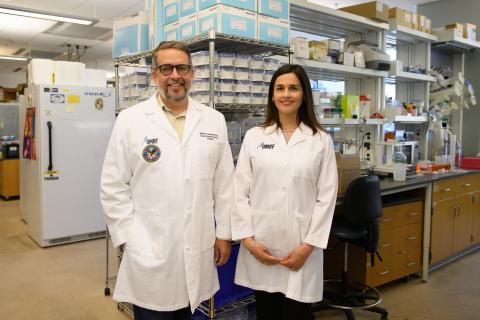Inflammation and Sex Differences Could Hold Clues to Macular Degeneration
Marilyn Perkins Freelance Science Writer
Preeti Subramanian, PhD Director, Vision Science Programs, BrightFocus Foundation



Marilyn Perkins Freelance Science Writer
Preeti Subramanian, PhD Director, Vision Science Programs, BrightFocus Foundation

Aging is the biggest risk factor for age-related macular degeneration (AMD), but recent research reveals that biological sex also plays an important role in how the brain and retina deteriorate over time. Still, it’s not fully understood why or how age and sex drive the development of AMD.
BrightFocus Foundation-funded researchers found that aging sparks inflammation in the retinal pigment epithelium (RPE), an important layer of the retina damaged in AMD. Inflammation is the body’s natural response to injury or infection. It can also occur in response to chronic health conditions, at which point it can become harmful rather than helpful. Minimizing inflammation is an important part of care and prevention for many diseases.
The study, led by Dr. Willard Freeman, a BrightFocus Macular Degeneration Research grant recipient, and co-principal investigator Dr. Ana Chucair-Elliott, used a genetically engineered mouse model to explore how age and sex influenced inflammation in the RPE.
Their results, published Neurobiology of Aging, revealed that inflammation was directly connected to damage and lost function in the RPE. Dr. Freeman and Dr. Chucair-Elliott say the study suggests that “inflammation could be an early part of the disease process in AMD.”

The researchers investigated whether this age-related increase in inflammation profile coincides with functional decline in the RPE and the retina. They found 437 genes that were more active in the RPE cells of the older mice, many of which were associated with inflammation. In these older mice, they found genes related to the immune system were also turned on in the RPE cells compared to younger mice. This could indicate that with age RPE cells may become more prone to inflammation.
However, a little more than one-third of these age differences weren’t present in both males and females. For example, some immune system genes only amplified with age in males, whereas their expression stayed static over the lifetime in females. The researchers also found similarities between aging in the RPE in their lab model and aging in human RPE during AMD, indicating that the findings might be relevant to human aging and disease.
Future studies should explore suppressing inflammation in the RPE as a potential avenue to stop or slow the disease, according to the authors. This work could be a step towards developing a treatment to protect damaged RPE cells.
Their research also drives home the necessity of including both sexes in research on vision loss and neurodegeneration. Research that includes both sexes will help avoid any dangerous, unintended side effects.
Dr. Freeman and Dr. Chucair-Elliott plan to continue studying the role of epigenetics in AMD. Epigenetics have been linked to nutrition, so their next step is to explore if certain diets may aggravate or reverse AMD. They say the library of change in gene expression profile they’ve identified can also be a springboard for any other researchers who want to investigate the link between AMD and aging RPE. “From our studies, we have generated a comprehensive dataset that is available for researchers to use and generate new targets in the field of AMD.”
“Millions of people in America suffer from AMD,” they continue. “We sincerely hope that the knowledge provided by our ongoing studies will later on be applied to the development of AMD treatments to promote healthy aging, extend retina health span and help individuals preserve vision for fuller lives.”
BrightFocus Foundation is a premier global nonprofit funder of research to defeat Alzheimer’s, macular degeneration, and glaucoma. Through its flagship research programs — Alzheimer’s Disease Research, Macular Degeneration Research, and National Glaucoma Research— the Foundation has awarded nearly $300 million in groundbreaking research funding over the past 51 years and shares the latest research findings, expert information, and resources to empower the millions impacted by these devastating diseases. Learn more at brightfocus.org.
Disclaimer: The information provided here is a public service of BrightFocus Foundation and is not intended to constitute medical advice. Please consult your physician for personalized medical, dietary, and/or exercise advice. Any medications or supplements should only be taken under medical supervision. BrightFocus Foundation does not endorse any medical products or therapies.
